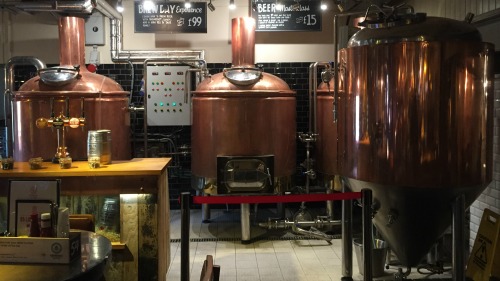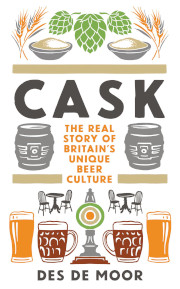
Brewhouse and Kitchen Highbury: a newer, bigger kit than originally planned in one of London’s newest brewpubs.
It’s now a year since the main text of the latest edition of The CAMRA Guide to London’s Best Beer, Pubs and Bars was finalised, and speciality brewing in the city continues to expand. The most obvious marker of this, and the one that’s grabbed the headlines over the past year, is the hitherto unprecedented, and not universally welcomed, appearance of multinationals with chequebooks at the ready.
The first evidence of this was SAB-Miller’s acquisition of Meantime in May 2015, just in time to squeeze into the guide. The deal was met with some concern and dismay, but no great surprise as Meantime had long been one of the most commercially-minded London micros and its CEO was actually a former executive of the South African-US combine. What Meantime might not have been expecting, though, was that before the year was out, SAB-Miller itself would be swallowed by the world’s biggest brewer, Brazilian-Belgian-US behemoth Anheuser-Busch InBev.
There was considerably more reaction to the news just before Christmas that Camden Town Brewery, which began in the cellar of a Hampstead pub as recently as 2006, had also sold out to AB InBev. Social media turned purple with the rage of beer fans who had considered the Kentish Town-based brewer one of their own, including numerous crowd funders for whom an offer to buy back their shares at an impressive 70% return could not offset their feelings of betrayal.
It was one of those occasions where the vision of a brewery as a social institution with stakeholders beyond the directors and shareholders, and the reality of a business that needs to expand to meet demand while continuing to pay salaries and dividends, seemed irreconcilable.
Personally, though I didn’t expect the opportunity to arise quite so quickly, I wasn’t at all surprised that Camden Town seized it. Brewery founder Jasper Cuppaidge is a smart, enterprising and effective businessman who has worked hard to build the reputation of his beers, and there’s no shame in wanting to reap the rewards. I’m sure he’s doing what he thinks is best to secure the ongoing success of his company.
I’m also not too concerned, at least for the moment, for the immediate survival of both breweries, nor for the quality of their beer. We are no longer in the 20th century, when big brewers bought smaller ones primarily for their pubs, as a way of expanding their market share under the tied house system.
Multinationals like AB InBev have been thrown by the international craft beer movement. Though the craft sector is still small, it’s important and high-value. The big boys know they need a presence, but with their mass-market brands and plants geared to mammoth production runs, they are poorly placed to gain one. So they are buying up more efficient and marketing-savvy smaller brewers to do it for them. Too much ‘dumbing down’ of these brewers’ products would be counter-productive; indeed, with additional investment, we might even see quality and consistency go up.
More concerning is the way that global capital inevitably treats the companies themselves as exchangeable commodities. Following the SAB-Miller deal, AB InBev knew it would face challenges from monopolies regulators, so announced it would take a ‘pro-active’ approach by selling off some of the assets of the combined group, including its partnership with Molson Coors in the US.
Though it’s highly unlikely the regulators would be bothered by the multinational owning more than one small London producer, Meantime was duly packaged up with Groslch and Peroni and placed in the shop window. After some speculation that a non-brewing investment fund would be tempted, the three breweries were finally sold to Asahi, the first time one of the big Japanese brewers has got involved in the UK and Europe. This sort of pass-the-parcel is the norm at this level of business, and it adds uncertainty to both breweries’ futures.

One of the most welcome ‘graduations’ from cuckoo to fully-fledged brewery: Bullfinch in Herne Hill.
Meanwhile, most London breweries continue to expand whatever their size, with Moncada and Redemption among those in the midst of long-needed upgrades. The startup rate has definitely slowed, though, and the brewery total in my latest update is down to 75 from 78 last July: a handful of closures include the last remnant of the 1970s Big Seven in London at the Stag, Mortlake, and a number of would-be brewpubs that evidently found it easier to sell other people’s beer.
But still new breweries continue to appear in long-dry locations, like Husk in Silvertown and Reunion in Feltham, while Bullfinch in Herne Hill is surely the most welcome recent graduation from a beer firm to a fully-fledged brewery. This update also acknowledges several new brands appearing since Bermondsey’s communal brewhouse Ubrew finally got its license.
The variety and quality of beer in London’s pubs, bars, restaurants and shops continues to grow too. Several bottle shops are adding new branches, and the increasing presence of a few interesting London-brewed bottles and cans on informal dining menus suggests the capital might yet reach the point where good local beer is taken for granted. So there’s still plenty to celebrate.
The most recent online update to the guide, including more information about all these developments and much more, is available as a PDF download here.






Loads of appreciation for your commitment to and efforts in updating the excellent LBBPB – best guide to current London beer scene by a mile. Having read through the latest update, to update your update on the Earl of Essex, if you haven’t dropped in really recently… although they have not restarted their own brewing unfortunately, some cask options have been back on the Beer Board on my last couple of visits in March/April. Three cask beers, and a couple of cask ciders if memory serves.
Cheers.
I’d love to hear a story of a micro brewery actually refusing to be taken over by a big multinational company. Most successful breweries succumb in the end, I guess you can’t blame them, as it must feel like a lottery win! But my admiration goes and always will to the small artisans out there.
Hugh — thanks for your kind words and glad you find the book useful. I did hear about the restoration of cask at the Earl of Essex but not before that update was completed. I’ll correct in the next update, which is due in time for GBBF/London Beer City week in August. Steve — I certainly don’t blame individuals for taking advantage of opportunities. Small brewers put in a lot of hard work to build up their businesses, and often get to a stage in their life where they simply can’t see themselves doing that indefinitely. For medium-sized companies, the decision often isn’t down to the founder, it might well be the shareholders and funders who push a brewery towards sale. I too admire the artisans — but ask any of them to talk about their working lives and you’ll realise quite what hard work it can be to earn not very much, even with a brand revered by enthusiasts.
Also worthy of comment was Redchurch’s crowd fund – an initial target of £200K was made and only just made it. IIRC the end date was extended by a week in which the total raised jumped to £500K. Quite remarkable really and in indication of the current scene.
Interesting to see the excellent Bullfinch also crowndfund but on a much more modest scale.
Thanks Ted. I think there might be some other examples of crowdfunding too. I’ll pick up on this in my next update.